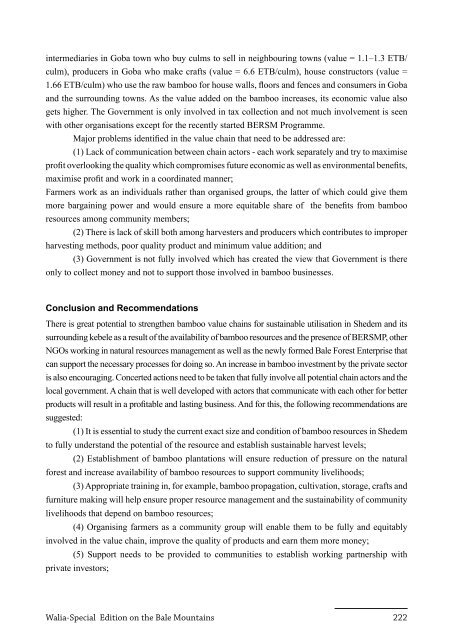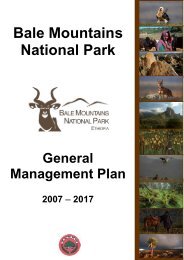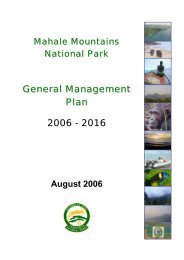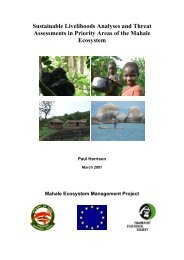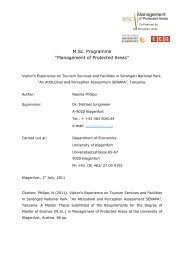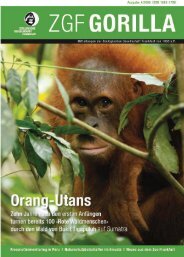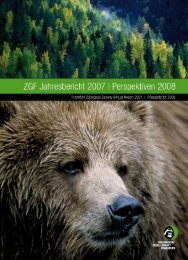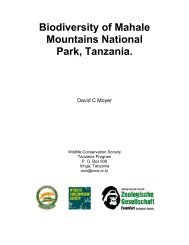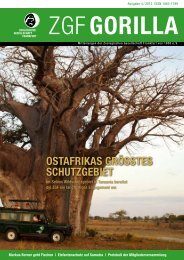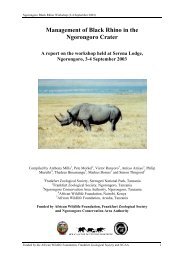Walia Special Edition on the Bale Mountains (2011) - Zoologische ...
Walia Special Edition on the Bale Mountains (2011) - Zoologische ...
Walia Special Edition on the Bale Mountains (2011) - Zoologische ...
Create successful ePaper yourself
Turn your PDF publications into a flip-book with our unique Google optimized e-Paper software.
intermediaries in Goba town who buy culms to sell in neighbouring towns (value = 1.1–1.3 ETB/<br />
culm), producers in Goba who make crafts (value = 6.6 ETB/culm), house c<strong>on</strong>structors (value =<br />
1.66 ETB/culm) who use <strong>the</strong> raw bamboo for house walls, floors and fences and c<strong>on</strong>sumers in Goba<br />
and <strong>the</strong> surrounding towns. As <strong>the</strong> value added <strong>on</strong> <strong>the</strong> bamboo increases, its ec<strong>on</strong>omic value also<br />
gets higher. The Government is <strong>on</strong>ly involved in tax collecti<strong>on</strong> and not much involvement is seen<br />
with o<strong>the</strong>r organisati<strong>on</strong>s except for <strong>the</strong> recently started BERSM Programme.<br />
Major problems identified in <strong>the</strong> value chain that need to be addressed are:<br />
(1) Lack of communicati<strong>on</strong> between chain actors - each work separately and try to maximise<br />
profit overlooking <strong>the</strong> quality which compromises future ec<strong>on</strong>omic as well as envir<strong>on</strong>mental benefits,<br />
maximise profit and work in a coordinated manner;<br />
Farmers work as an individuals ra<strong>the</strong>r than organised groups, <strong>the</strong> latter of which could give <strong>the</strong>m<br />
more bargaining power and would ensure a more equitable share of <strong>the</strong> benefits from bamboo<br />
resources am<strong>on</strong>g community members;<br />
(2) There is lack of skill both am<strong>on</strong>g harvesters and producers which c<strong>on</strong>tributes to improper<br />
harvesting methods, poor quality product and minimum value additi<strong>on</strong>; and<br />
(3) Government is not fully involved which has created <strong>the</strong> view that Government is <strong>the</strong>re<br />
<strong>on</strong>ly to collect m<strong>on</strong>ey and not to support those involved in bamboo businesses.<br />
C<strong>on</strong>clusi<strong>on</strong> and Recommendati<strong>on</strong>s<br />
There is great potential to streng<strong>the</strong>n bamboo value chains for sustainable utilisati<strong>on</strong> in Shedem and its<br />
surrounding kebele as a result of <strong>the</strong> availability of bamboo resources and <strong>the</strong> presence of BERSMP, o<strong>the</strong>r<br />
NGOs working in natural resources management as well as <strong>the</strong> newly formed <strong>Bale</strong> Forest Enterprise that<br />
can support <strong>the</strong> necessary processes for doing so. An increase in bamboo investment by <strong>the</strong> private sector<br />
is also encouraging. C<strong>on</strong>certed acti<strong>on</strong>s need to be taken that fully involve all potential chain actors and <strong>the</strong><br />
local government. A chain that is well developed with actors that communicate with each o<strong>the</strong>r for better<br />
products will result in a profitable and lasting business. And for this, <strong>the</strong> following recommendati<strong>on</strong>s are<br />
suggested:<br />
(1) It is essential to study <strong>the</strong> current exact size and c<strong>on</strong>diti<strong>on</strong> of bamboo resources in Shedem<br />
to fully understand <strong>the</strong> potential of <strong>the</strong> resource and establish sustainable harvest levels;<br />
(2) Establishment of bamboo plantati<strong>on</strong>s will ensure reducti<strong>on</strong> of pressure <strong>on</strong> <strong>the</strong> natural<br />
forest and increase availability of bamboo resources to support community livelihoods;<br />
(3) Appropriate training in, for example, bamboo propagati<strong>on</strong>, cultivati<strong>on</strong>, storage, crafts and<br />
furniture making will help ensure proper resource management and <strong>the</strong> sustainability of community<br />
livelihoods that depend <strong>on</strong> bamboo resources;<br />
(4) Organising farmers as a community group will enable <strong>the</strong>m to be fully and equitably<br />
involved in <strong>the</strong> value chain, improve <strong>the</strong> quality of products and earn <strong>the</strong>m more m<strong>on</strong>ey;<br />
(5) Support needs to be provided to communities to establish working partnership with<br />
private investors;<br />
<str<strong>on</strong>g>Walia</str<strong>on</strong>g>-<str<strong>on</strong>g>Special</str<strong>on</strong>g> <str<strong>on</strong>g>Editi<strong>on</strong></str<strong>on</strong>g> <strong>on</strong> <strong>the</strong> <strong>Bale</strong> <strong>Mountains</strong> 222


